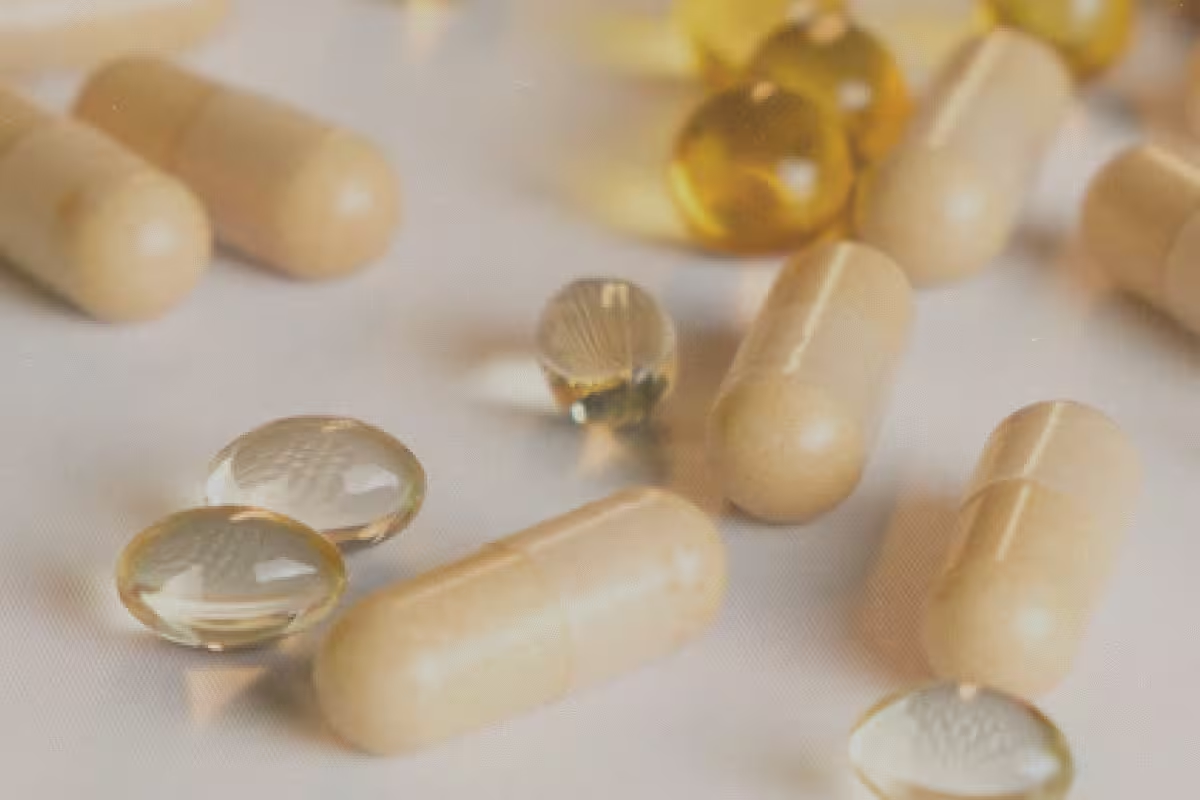

Vaginal Dryness: What It Feels Like and How to Treat It
Learn what vaginal dryness feels like, why it happens, and effective treatments, including HRT, lubricants, and lifestyle tips to restore comfort.
Words by Olivia Cassano
Scientifically edited by Dr. Krystal Thomas-White, PhD
Medically reviewed by Dr. Kate McLean MD, MPH, FACOG
Vaginal dryness can happen at any age and can affect your comfort, sexual health, and overall quality of life. Many people experience it temporarily, while others may notice it as a persistent issue. It can show up in ways that are uncomfortable, confusing, or just plain annoying. Some people notice tightness, stinging, or a scratchy feeling that makes everyday movements or sitting for long periods uncomfortable.
The good news is that vaginal dryness is highly treatable, and there are ways to restore comfort, sexual pleasure, and confidence. Understanding what it feels like, why it happens, and what options are available can make a big difference. Keep reading to learn more about the symptoms, causes, and treatments so you know what to expect and how to get help.
What does vaginal dryness feel like?
Vaginal dryness (also called vaginal atrophy or atrophic vaginitis) can feel different for each person, but most people describe a range of noticeably uncomfortable sensations. Symptoms of vaginal dryness include:
- A feeling of tightness or constriction.
- Stinging, burning, or irritation around the vulva, vaginal opening, or inside the vaginal canal.
- A rough or scratchy feeling, almost as if the tissues are less smooth than usual.
Painful sex is another hallmark of vaginal dryness. Sex can become uncomfortable, and you may feel friction or even tearing. Some people also notice that the natural “wetness” that normally accompanies arousal is reduced or absent, which can make intimacy frustrating or painful.
It’s important to know that these sensations can sometimes overlap with symptoms of vaginal infections, like yeast infections or bacterial vaginosis (BV). Burning, itching, and irritation aren’t exclusive to dryness, which is why an accurate diagnosis is essential. Your healthcare provider — or taking Evvy’s Vaginal Health Test — can help identify whether dryness, infection, or another condition is causing your symptoms. Getting the right diagnosis means you can treat the problem effectively, rather than just blindly managing the discomfort.

Recurrent symptoms? Get Evvy's at-home vaginal microbiome test, designed by leading OB-GYNs.
Early signs of vaginal dryness you may not recognize
Vaginal dryness doesn’t always appear suddenly or dramatically. Sometimes it starts subtly, and you might not even connect the symptoms to dryness at first. One sign is an increase in urinary tract or vaginal infections. When vaginal tissues are dry, the natural barrier against bacteria is weakened, making infections more likely.
Another subtle indicator can be light bleeding or spotting after having sex. This happens because the tissues are more delicate and prone to tearing when lubrication is low. You might also notice persistent genital discomfort that isn’t linked to a particular activity — like a constant sense of irritation, itching, or rawness.
These early signs can easily be mistaken for other issues, including infections or irritation from feminine hygiene products. That’s why paying attention to changes in your vaginal health is important. Recognizing subtle symptoms early means you can address dryness before it becomes more severe, improving comfort and preventing complications.
Why does vaginal dryness happen?
Vaginal dryness occurs when the tissues in and around the vagina don’t get enough moisture and natural lubrication. This can make the area feel tight, rough, or irritated, and can lead to discomfort during everyday activities or sexual activity. One of the main reasons this happens is hormonal changes, especially decreases in estrogen. Estrogen is crucial for vaginal health because it keeps the tissues soft, elastic, and well-lubricated, and it helps maintain a healthy vaginal pH and microbiome.
When estrogen drops, the vaginal walls can become thinner and less flexible, reducing the natural moisture that normally protects and cushions the tissues (vaginal discharge). This can happen during menopause, when hormone production naturally declines, or postpartum, and when breastfeeding, when hormone levels shift dramatically after pregnancy and childbirth. Certain medical treatments, such as cancer treatment like chemotherapy, radiation, or surgical removal of the ovaries, can also lower estrogen levels and trigger dryness. Even younger people can experience temporary dryness due to factors like stress, medications, or hormonal contraceptives.
Over time, untreated vaginal dryness can make the tissues more fragile, increasing the likelihood of irritation, tears, or infections. It can also affect sexual comfort, making intercourse painful or less pleasurable. Understanding that estrogen plays a central role in vaginal moisture helps explain why treatments like localized vaginal estrogen or hormone replacement therapy are often so effective at restoring comfort and tissue health.
Other factors can contribute to dryness as well. Stress, anxiety, and fatigue can affect sexual arousal, reducing natural lubrication. Certain medications, such as antihistamines, antidepressants, and birth control, may also interfere with vaginal moisture. Lifestyle factors like smoking, inadequate hydration, or frequent use of harsh soaps can irritate delicate tissues, exacerbating dryness.
Sometimes, vaginal dryness is linked to conditions like autoimmune disorders, diabetes, or hormonal imbalances. Even without an obvious cause, the effects can be noticeable and persistent.
Vaginal dryness & the microbiome
Your vaginal microbiome — the ecosystem of bacteria living in your vagina — plays a crucial role in maintaining moisture, pH balance, and overall tissue health. When the microbiome is disrupted, it can contribute to dryness, irritation, and increased risk of infections.
Vaginal dryness is particularly common after menopause, when your body starts producing less estrogen. Lower estrogen can alter the microbiome, leading to reduced protective bacteria and thinner, less lubricated vaginal tissue. Without treatment, symptoms like burning, irritation, and painful sex can worsen over time.
The good news is that vaginal dryness is treatable, and understanding the state of your microbiome can help guide the best approach. Microbiome testing, like Evvy’s Vaginal Health Test, can identify imbalances or shifts that may be contributing to dryness. This insight allows your provider to recommend targeted treatments that restore both comfort and microbial health.
What happens if it’s untreated
If vaginal dryness is left untreated, it can lead to a range of physical and emotional complications. One of the most common consequences is painful sex. Without adequate lubrication, intercourse can cause friction, tearing, and pain, which may lead to reduced sexual desire or avoidance of intimacy.
A dry vaginal lining is also more susceptible to infections. UTIs, yeast infections, and bacterial vaginosis become more frequent when natural barriers are weakened. In some cases, chronic dryness can contribute to urinary symptoms, including increased urgency or a burning sensation when you pee.
The impact isn’t only physical. Persistent vaginal dryness can affect relationships and mental health, leading to stress, embarrassment, or reduced confidence. Daily life may also be affected if sitting for long periods or wearing certain clothing becomes uncomfortable. Addressing vaginal dryness early can prevent these issues, improving both health and overall quality of life.
Treatment for vaginal dryness
The good news is that there are many effective ways to treat vaginal dryness, ranging from simple over-the-counter options to hormone therapy. Treatment options aim to restore moisture, improve tissue health, and restore comfort.
- Vaginal estrogen therapy is one of the most effective treatments, especially for dryness caused by hormonal changes. Low-dose estrogen can be applied directly to the vagina via creams, tablets, or rings. This therapy helps thicken tissues, increase natural lubrication, and reduce irritation.
- Non-hormonal lubricants and vaginal moisturizers provide immediate relief during sexual activity. Lubricants reduce friction, while vaginal moisturizers can help maintain moisture for several hours or days. They’re available in water- or silicone-based formulations and are safe for most people.
- Hormone replacement therapy (HRT) can also help when dryness is linked to menopause or other hormonal shifts. By restoring estrogen levels systemically, HRT improves tissue elasticity, hydration, and natural lubrication. Many people notice a significant reduction in pain during sex and everyday activities, and HRT can also help prevent tissue thinning over time. Your provider can recommend the best delivery method (whether pills, patches, or gels) based on your symptoms and overall health. HRT is usually recommended if you're experiencing other symptoms, like hot flashes or mood swings.
If you're dealing with more severe or lingering symptoms, your healthcare provider might suggest some prescription options or advanced therapies. These could involve higher doses of estrogen, selective estrogen receptor modulators, or other targeted treatments. Your provider will work with you to find the best approach that fits your unique symptoms, medical history, and lifestyle.
Alongside these treatments, simple lifestyle changes can also help improve comfort. Avoid perfumed soaps or intimate washes, which can irritate delicate tissues, and choose breathable cotton underwear to reduce friction and allow airflow. These small steps, combined with other treatments, can make a noticeable difference in reducing dryness and irritation.
Combining treatments and lifestyle adjustments is often the most effective strategy. For example, using over-the-counter moisturizers regularly while applying low-dose estrogen or HRT, and making small daily changes, can improve both comfort and tissue health. With the right approach, most people experience significant relief and restoration of vaginal health.
Supporting your vaginal health with Evvy
Understanding your vaginal health is an important first step in addressing dryness. Evvy’s Vaginal Health Test examines the balance of bacteria and other microbes in your vagina, which can influence tissue health, moisture, and pH levels. Changes in the vaginal microbiome — like a reduction in protective bacteria — can contribute to dryness, irritation, and an increased risk of infections. By identifying these imbalances, the test helps your healthcare provider understand the underlying causes of dryness, such as vaginal atrophy or microbial shifts, and guide you toward the most effective, targeted treatments.
For symptom relief, you can access treatments to support vaginal moisture and comfort. Our Hyaluronic Acid Suppositories work by attracting and retaining water in the vaginal tissues, helping them stay soft, hydrated, and more elastic. This can reduce irritation and burning, and make daily activities or sex more comfortable. Evvy's Soothing Vulva Cream targets external irritation, calming redness, itchiness, and sensitivity around the vulva, which is often affected when dryness is present.
Using these tools alongside guidance from a healthcare provider can help manage symptoms more effectively and prevent dryness from worsening. Early attention to vaginal health can make a meaningful difference in comfort, intimacy, and overall well-being.
FAQs about vaginal dryness
How do I know if I’m dry down there?
Vaginal dryness can feel like tightness, burning, or irritation. You might notice uncomfortable friction during sex, a rough or scratchy feeling inside the vagina, or general soreness around the vulva. It can also lead to light bleeding or increased urinary infections. If these symptoms sound familiar, speak to your healthcare provider or take an Evvy Vaginal Health Test to identify the cause and guide treatment.
What can I use to relieve vaginal dryness?
There are several effective options. Over-the-counter lubricants reduce friction during sexual intercourse, and vaginal moisturizers help maintain moisture long-term. Evvy’s Hyaluronic Acid Suppositories can hydrate tissues, while vaginal estrogen therapy is highly effective for hormone-related dryness. Your provider can help determine the best approach for your situation.
Why am I dry even when aroused?
This can happen due to a phenomenon called arousal nonconcordance, where physical signs of arousal (like lubrication) don’t match how aroused you feel mentally or emotionally. Hormonal changes, stress, medications, or tissue health can also affect natural lubrication. Treatments like moisturizers, lubricants, or vaginal estrogen can help restore comfort regardless of arousal levels.
How long will vaginal dryness last?
The duration varies depending on the cause. Temporary dryness may improve once triggers like stress, medications, or minor hormonal shifts are addressed. Persistent dryness related to menopause, hormonal changes, or tissue thinning typically requires ongoing treatment. With proper care (like lubricants, vaginal moisturizers, or targeted therapies), symptoms can be managed effectively, often leading to lasting relief.





